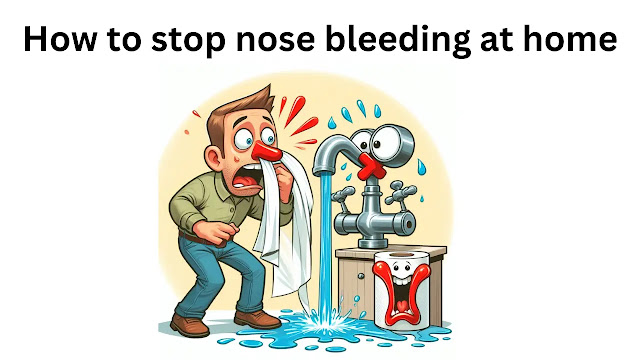Stopping a Nosebleed at Home: Regaining Control and Relief
Nosebleeds, though startling, are a frequent occurrence for many people. While often harmless, they can be stressful and messy. Fortunately, in most cases, nosebleeds can be effectively treated at home with a few simple steps. This guide will equip you with the knowledge and techniques to address a nosebleed calmly and confidently.
Understanding Nosebleeds: Why Does My Nose Bleed?
The delicate network of blood vessels within the nose is fragile and prone to irritation. Several factors can contribute to nosebleeds, including:
Dry air: Dry climates, winter heating, and low humidity can dry out the nasal membranes, making them more susceptible to irritation and rupture.
Allergies and sinusitis: Inflammation caused by allergies or sinus infections can irritate and weaken the blood vessels in the nose.
Picking or blowing your nose: Vigorously picking or blowing your nose can rupture these delicate blood vessels.
Facial injuries: A blow to the face can damage the blood vessels in the nose.
Certain medications: Such as blood thinners and aspirin can increase your risk of nosebleeds.
High blood pressure: Uncontrolled high blood pressure can strain the blood vessels in the nose, leading to rupture.
Stopping the Bleed: Regaining Control
If you experience a nosebleed, here’s what to do:
Stay Calm: It’s important to remain calm to prevent further blood pressure spikes that can worsen the bleeding.
Sit Upright: Lean forward slightly and avoid tilting your head back. This prevents blood from draining down your throat, which can cause nausea and vomiting.
Pinch Your Nose: Using your thumb and index finger, firmly pinch the soft part of your nose just above the nostrils. Breathe through your mouth for 10-15 minutes. Set a timer to ensure you apply constant pressure for the full duration.
Apply a Cold Compress: If available, place a cool compress (a washcloth soaked in cold water) on the bridge of your nose. The cold helps constrict blood vessels, promoting clotting.
Avoid Picking or Blowing: Resist the urge to pick your nose or blow forcefully. This can irritate the already sensitive area and worsen the bleeding.
After the Bleeding Stops:
- Relax and remain upright for 30 minutes.
- Avoid strenuous activity for several hours.
- Don’t put anything in your nose, including cotton balls or tissues.
- Avoid blowing your nose for at least 24 hours.
- Apply a petroleum jelly ointment to the inside of your nostrils to keep them moist.
Preventing Nosebleeds: Proactive Measures
While nosebleeds can happen occasionally, there are steps you can take to minimize their occurrence:
- Use a humidifier: Especially in dry climates or during winter, a humidifier adds moisture to the air, preventing the nasal membranes from drying out.
- Saline nasal spray: Regularly using a saline nasal spray can help moisten the nasal passages.
- Avoid irritants: Limit exposure to smoke, dust, and other airborne irritants.
- Treat allergies: Manage allergies with medication or consult a doctor for an allergy management plan.
- Trim your nails: Keep your fingernails short and smooth to prevent accidental injury while picking your nose.
- Maintain a healthy blood pressure: Regularly monitor your blood pressure and consult your doctor if it’s elevated.
When to Seek Medical Attention
In most cases, nosebleeds resolve with home treatment. However, seek medical attention if you experience:
- Bleeding that persists for more than 20 minutes despite applying constant pressure.
- Heavy or continuous bleeding.
- Difficulty breathing.
- Blood running down the back of your throat (postnasal drip).
- Nosebleeds after a facial injury.
- Frequent nosebleeds (several times a week).
By following these tips, you can effectively address nosebleeds at home and take preventative measures to minimize their occurrence. Remember, if the nosebleed persists or you experience any concerning symptoms, don’t hesitate to seek medical attention.

